 Your new post is loading...
 Your new post is loading...
Loyalty is not a common resolution to crisis situations, but it should be and likely will become, as organizations realize the immediate value of the customer information loyalty programs provide. In a crisis, such insights could make the difference between quarterly losses or gains. “The only way they can restore their customers’ loyalty is having that data and maintaining that data and then responding to the consumer in any way possible to make amends,” said Britt Beemer, founder of America’s Research Group, a customer behavior firm that has performed research for at least 30 companies in crisis. “There are a lot of things you can do to win.” Many companies rely on their PR teams to lift them from a public black eye, but fewer take full advantage of the resources that exist in their loyalty marketing teams. Indeed, rewards programs can often times be sub-optimized to enhance overall business results, be it in a crisis or day-to-day operations. We spoke with several experts in crisis communications about how to use loyalty to regroup and recover from a potential public relations crisis. Following is their advice....
It was late morning on Friday, October 16, when Elizabeth Holmes realized that she had no other choice. She finally had to address her employees at Theranos, the blood-testing start-up that she had founded as a 19-year-old Stanford dropout, which was now valued at some $9 billion. Two days earlier, a damning report published in The Wall Street Journal had alleged that the company was, in effect, a sham—that its vaunted core technology was actually faulty and that Theranos administered almost all of its blood tests using competitors’ equipment.
The article created tremors throughout Silicon Valley, where Holmes, the world’s youngest self-made female billionaire, had become a near universally praised figure. Curiosity about the veracity of the Journal story was also bubbling throughout the company’s mustard-and-green Palo Alto headquarters, which was nearing the end of a $6.7 million renovation. Everyone at Theranos, from its scientists to its marketers, wondered what to make of it all....
Olympian Ryan Lochte, who was dropped this week by major sponsors including Speedo and Ralph Lauren, has found a brand willing to take him on. Pine Bros. Softish Throat Drops signed an endorsement deal today with Lochte, who will appear in commercial and print ads for the brand. The swimmer thanked the company in a tweet today. Lochte embellished the story of what he claimed was a robbery at gunpoint with fellow swimmers at a gas station in Rio de Janeiro during the Olympics earlier this month, lying about it to NBC's Billy Bush and Matt Lauer (and inspiring some shade from the likes of Al Roker, Stephen Colbert and John Oliver, who all called him out for his behavior). Lochte apologized to Lauer in an interview that aired on the Today Show on Monday, saying that he "over-exaggerated" the events of that night. Lochte's ads for Pine Bros. will feature the tagline, "Pine Brothers Softish Throat Drops: Forgiving On Your Throat," just as the company—and Lochte, himself —is asking the public to forgive him. ...
Speedo and Ralph Lauren have ended relationships with U.S. Olympian Ryan Lochte, a decision that comes after the swimmer was accused of fabricating his tale of being robbed in Rio de Janeiro.
"Speedo USA today announces the decision to end its sponsorship of Ryan Lochte," the brand announced in a statement. "As part of this decision, Speedo USA will donate a $50,000 portion of Lochte's fee to Save the Children, a global charity partner of Speedo USA's parent company, for children in Brazil."
As for Ralph Lauren, the company said its endorsement agreement with Lochte "was specifically in support of the Rio 2016 Olympic Games and the company will not be renewing his contract." ...
Welcome to the findings of the BrightLocal Local Consumer Review Survey 2015.
This annual survey is an exploration into how consumers both read & use online reviews. It seeks to qualify the value that users place on reviews that they read & how this impacts their opinions & actions when searching for a local business to use. The survey is specifically concerned with reviews for local business services and not wider product reviews. Key 'Takeaways' From Research: - 92% of consumers now read online reviews (vs. 88% in 2014)
- 40% of consumers form an opinion by reading just 1-3 reviews (vs. 29% in 2014)
- Star rating is #1 factor used by consumers to judge a business
- 44% say a review must be written within 1 month to be relevant
- Only 13% of consumers consider using a business that has a 1 or 2 star rating
- 68% say positive reviews make them trust a local business more (vs. 72% in 2014)
- Consumers are becoming more concerned about fake reviews
Back in 2004, media and TV personality Martha Stewart was sentenced to five months in jail for obstructing a federal securities investigation. To pass the time during her incarceration, Stewart did what she does best: cooking and crafts. Speaking at a Daily Mail brunch session at the Cannes Lions advertising festival on Thursday, Stewart said the food inside was around three years past its expiry date. "That's why I made jam out of the crab apples on the trees," she added. Aside from making jam, Stewart also turned her hand to ceramics. As a child she'd go to ceramic classes at the weekend, so she quickly signed up to a ceramics class in prison too, at a place called Alderson....
So people don’t trust brands – but what does that MEAN?
That they think you’re overcharging them?
That they’re worried you’ll lose their credit card information to hackers?
That they wouldn’t ask you to watch their cocker spaniel for the afternoon?
Mistrust comes from a disconnect between what you say and what you do.
A whopping 78% of people think that in general, brands are NOT open and honest. In fact, only 1 in 4 people thinks that brands actually do what they say they’re going to do – a level of mistrust typically reserved for badly behaved toddlers and black market organ dealers.
This doesn’t mean you or your business have necessarily made people feel misled – but it means you still have to work a lot harder to make up for the damaged caused by brands in general....
The Republican frontrunner met with the editorial board on Monday morning. The full transcript follows at the link above: FREDERICK RYAN JR., WASHINGTON POST PUBLISHER: Mr. Trump, welcome to the Washington Post. Thank you for making time to meet with our editorial board. DONALD TRUMP: New building. Yes this is very nice. Good luck with it. RYAN: Thank you… We’ve heard you’re going to be announcing your foreign policy team shortly… Any you can share with us? TRUMP: Well, I hadn’t thought of doing it, but if you want I can give you some of the names… Walid Phares, who you probably know, PhD, adviser to the House of Representatives caucus, and counter-terrorism expert; Carter Page, PhD; George Papadopoulos, he’s an energy and oil consultant, excellent guy; the Honorable Joe Schmitz, [former] inspector general at the Department of Defense; [retired] Lt. Gen. Keith Kellogg; and I have quite a few more. But that’s a group of some of the people that we are dealing with. We have many other people in different aspects of what we do, but that’s a representative group....
We (and the rest of the internet for the past decade) have already spent some time convincing you of the importance of acquiring online reviews for your business. So let's just assume you're sold on the benefits of having a bunch of people tout how awesome you are on the web.
That being said, it's not safe to assume we all know exactly where in the wide world of the web we can point those well wishers when they want to sing our praises. I mean, we might all be able to rattle off one or two sites ("Yelp! And I think you can get them to show up in Google Maps, too?"), but we don't exactly have a laundry list of options at our disposal.
Check out our list of the best product review websites for B2B and B2C companies. Keep in mind that every industry has niche sites, too. For instance, those in the restaurant industry may want to be on UrbanSpoon. This blog post won't get into sites that are specific to one industry, but it will provide review sites that apply to businesses in almost any industry....
When it comes to conducting business online, trust is one of the scarcest and hardest-to-earn resources. No amount of money can purchase it, and it’s incredibly difficult to replace once it has been lost. Trust can be a defining factor that drives potential customers to choose your products or services over those of your competitors, so you can’t afford to overlook it.
To make establishing trust easier, let’s examine some simple tips that you can start incorporating into your marketing strategies today. These seven techniques involve educating consumers, personalizing marketing messages, and providing a positive user experience to help you get the most out of your investment and increase sales....
It is going to be difficult to disentangle corporate reputation challenges from the turbulent political environment in 2016. Whether it’s the Chinese currency crisis, the potential British exit from the EU, or the presidential election in the US, political events create lessons to learn and challenges to face for senior corporate communicators....
t every marketing effort can be a success, that’s why there’s testing and optimization programs – to find what works and build on those wins and learn from those losses. And usually when things don’t totally go as planned, the result is more, "meh," than "time to break the panic glass."
But then there are situations marketers never want to find themselves in, whether it’s a social media meltdown of their own creation or worse, a full-blown crisis.
Here are cautionary tales from 2015 where marketing definitely went wrong... in a major way
Today more than ever, food has become one of the most important—and discussed—choices among U.S. consumers. Since food purchases are heavily influenced by trust, Boston-based consultancy C Space released a study exploring customers' perceptions. "In today's marketplace, consumers are more actively engaged than ever in choosing what foods to buy and what brands to buy them from," said Alan Moskowitz, director at C Space.
"Given the speed that information travels, brand trust can increase or erode very quickly in consumers' minds. For brands, staying close to their customers can help them stay in touch with evolving attitudes and help them collaborate with consumers on new products, packaging and marketing that earns or maintains trust."...
|
Skittles has responded with uncharacteristic yet appropriate seriousness after being dragged into the presidential race by Donald Trump Jr., son of the Republican nominee, who posted a controversial tweet on Monday with an analogy about Skittles and refugees. Here is Donald Trump Jr.'s tweet... Within hours, Denise Young, vp of corporate affairs at Skittles parent Wrigley Americas, responded with a tersely word statement. "Skittles are candy. Refugees are people," she said. "We don't feel it's an appropriate analogy. We will respectfully refrain from further commentary as anything we say could be misinterpreted as marketing."...
Mylan and its CEO Heather Bresch are under fire. It raised the price of its EpiPen product — an essential protection for people with life threatening allergies — by a factor of five in the last eight years. Mylan’s statement defending itself clarifies what it’s doing — providing rebates — but evades the main issue of why it increased the price in the first place. Here’s the dialogue between Mylan and the public, in a nutshell: Public: Why is this thing so hellishly expensive? Mylan: We’ll help you afford it with coupons and rebates. Public: Why is this thing so hellishly expensive? Mylan: We’re on your side. It’s the insurance regulations. Public: Why is this thing so hellishly expensive??? RtMylan: We even give some away to schools!S So Mylan’s position is that it won’t explain the massive price increase on a product where it has a monopoly on a generic medication product that millions of people could die without, a product that’s essentially unchanged from past years....
Take 2010, when BP was confronted with one of the biggest oil spills in history. It appeared that the organization waited to reveal all the facts until they knew that the spill had become unstoppable. Or 2015, when the U.S. Environmental Protection Agency and the California Air Resources Board uncovered widespread cheating by Volkswagen on emissions standards – something Michael Horn, president and CEO of Volkswagen America, was alerted to a year earlier but remained silent. Even when the EPA confronted the company with their findings, Volkwagen missed the opportunity to communicate first. And more recently, The Wall Street Journal revealed a culture of secrecy at blood-testing start-up Theranos and questioned the effectiveness of the technology driving their operation, leading to a federal investigation.
In each case, the organization failed to self-disclose a crisis, and as a result, each faced enormous negative publicity that continues to draw critical attention from a broad public. Even Hollywood is interested: movies have been made, or are in the works, about all three scandals. The longstanding impact of a failure to acknowledge a problem cannot be overstated.
How should companies handle a crisis differently? Our research focuses on an alternative approach, one that is referred to as “stealing thunder.” It involves self-disclosing crises and major issues before media gets hold of the story. Earlier studies on stealing thunder have found that self-disclosing organizational crises increases the credibility of organizational spokespersons. When an organization breaks the news about incriminating events, these problems will also appear less severe. In addition, organizations that steal thunder are considered more reliable and consumers are more inclined to continue purchasing their products. Our recent study adds to these findings by examining if self-disclosing an organizational crisis may be as effective as it is because old news is considered no news. When self-disclosing incriminating information, individuals will perceive the subsequent negative publicity as old news, and hence, pay less attention to it....
Never ruin an apology with an excuse." – Ben Franklin
In less than 24 hours, two of the biggest stories in the world involved some kind of "apology" for offensive behavior and/or lying. Last night in Charlotte, North Carolina, the notoriously unrepentant Donald Trump shocked observers by expressing "regret" for words that "may have caused personal pain." And this morning Ryan Lochte issued a widely criticized apology for "not being more careful" with how he described an incident in which he lied about being held up at gunpoint in Rio de Janeiro.
Neither of them qualified as a true apology since they both offered an excuse for their behavior, failed to give a detailed account of what happened, failed to acknowledge or specify the hurt and damage they’d caused, and didn't take responsibility for the situation.
A proper apology is "an exercise in honesty, accountability, and compassion," says interfaith minister Lauren Bloom, the author of The Art of the Apology. Of course, it's difficult and nerve-wracking and fraught with tension. But it's the right thing to do. So above all, be sincere: "It's the essence of an apology."...
Americans hold a more favorable opinion of CEOs who take public stances on controversial topics, according to “The Dawn of CEO Activism,” a study released by Weber Shandwick and KRC Research. Weber Shandwick has identified CEO activism as a factor that can “drive and differentiate corporate reputation.” Leaders taking a stance on hot-button issues is powerful. However, “The Dawn of CEO Activism” advises caution, stating that CEOs should be careful in choosing topics they speak out on. The research, which can be found here, extracted five key tenets of CEO activism, illustrating the pros and cons of vocal corporate leadership....
What's a little e coli among friends? That's the question US fast-casual dining chain Chipotle will soon be asking its best customers. After publicly eschewing the idea of launching a customer loyalty programme last year, Chipotle executives said on an earnings call last week that they aim to stem the flood of frequent diners abandoning the chain with - wait for it - a loyalty programme. Though the programme is likely to be temporary, Chipotle hopes it will reignite customer passion for bowls and burritos. The problem: Chipotle executives still seem to display a fundamental misunderstanding of the purpose of loyalty programmes.
The announcement was one of the only positives in an earnings call that can only be described as apocalyptic: same store sales fell nearly 30% in the first quarter of 2016 and the company posted a net loss of $26.4 million. The company has tried everything to pull out of the free fall: giving away millions of free burritos, BOGO offers, national advertising campaigns; nothing has worked. Money quote from reporter Virginia Chamlee over at eater.com:
"The aim is to target the most loyal Chipotle consumer — i.e. the one who visits 25 or more times per year. The company saw the largest declines among its top loyal (25+ visits a year) and its 'light' consumers (those that visit two to five times per year). Noting the decline in visits amongst its once most-loyal customers, [Chief Marketing and Development Officer Mark] Crumpacker said the company would love to get that 'habit' back up. "We do believe it's beneficial to us to get people back in the habit of visiting Chipotle [as often as they used to]."...
Since 2012, Cohn & Wolfe has studied authenticity as a guiding principle and business practice. Each year, our research reveals more insight on the strategic power of authenticity and its unique opportunity to build reputation.
Cohn & Wolfe has discovered a huge authenticity gap in the eyes of global consumers. With 75 percent of consumers surveyed in 14 markets believing that companies are not open and transparent, it’s clear that brands have a credibility problem.
Our 2016 findings reveal that cynicism towards brands is highest among Western European countries, while high growth / low per capita GDP countries recognize authenticity in brands the most.
Across global markets, approximately one in five consumers finds brands “Open and Honest.” At 23 percent, the US places just above the global average. In Western Europe, a mere 5 percent of consumers in Sweden consider companies “Open and Honest,” while the UK, France, Germany and Spain all match the same low level at 7 percent.
Brazil, while generally higher than Western Europe, is still lower than the US at 19 percent.
Even in China and Indonesia, where consumers are least pessimistic about brand authenticity, only about a third of the population (36 percent and 35 percent, respectively) consider companies “Open and Honest.”
The opportunity for businesses to close this gap is staggering....
No matter how well you prepare, sometimes things just go out of your control. It is not always possible to prevent a crisis. When it comes to PR campaigns, learning from your mistakes can be too costly. The trick should therefore be learning from other people’s mistakes.
According to the First Research study, the U.S. public relation industry is estimated to be at $10 billion, with above 7,000 U.S. firms in action in 2013. Still a large number of businesses suffer the adverse effects of PR disasters. Why is it so? Let’s take a take look at the factors that lead to PR disasters
This year’s Trust Barometer shows something amazing. The biggest increase in trust hasn’t been in the media or NGOs or the government… it’s been in the private sector.
The general public wants businesses to lead the way when it comes to societal issues. More specifically… Edelman says the data shows people want CEOs to be more visible.
They want to know the person leading a business. They want to know their values and where they stand on social issues....
Yesterday I had the pleasure of attending my seventh Edelman Trust Barometer launch event in Toronto. This year’s results are some of the most interesting I’ve seen, highlighting a disparity in trust amongst what we call the “informed” public and the mass population, and the ongoing failure of businesses to live up to the expectations that people have of them when it comes to societal good (you can see the full results on SlideShare).
One of the interesting notes in this year’s Canadian Trust Barometer results was that trust in social media has fallen over the last year. In fact, social media was the only one of the five media types we examined to experience a decline in trust....
It’s almost as if Volkswagen AG CEO Matthias Müller studied the performance of infamous British Petroleum CEO Tony “I’d like my life back” Hayward and said, “Yes, that’s how I’d like to respond to our own company’s crisis.”
VW, which is in the midst of an emissions-rigging scandal affecting millions of vehicles, has been accused by regulators of intentionally programming its engines to fool laboratory emissions tests.
Last week, Müller gave a phone interview to National Public Radio that went so poorly, he had to ask for a do-over. The first time around, the reporter asked him about the perception that his company has an ethical problem, not merely a technical one. He responded, “It was an ethical problem? I cannot understand why you say that.”
As you might imagine, that answer landed like a lead balloon—and his staff quickly blamed his tin-ear response on a noisy environment. According to Bloomberg Business...
Transparency is important to all elements of the food movement, but it is particularly relevant in the realm of chocolate, Carla Martin, lecturer on African and African American Studies at Harvard University, and founder and executive director of the Fine Cacao and Chocolate Institute, told Quartz. She cites examples like Cadbury’s ignoring the use of slave labor in its supply chain in the early 1900s, and early industrial chocolate makers who were found to be bulking up chocolate with corn sugar.
“It’s something that people involved in the craft chocolate movement are very concerned with,” she says. “There are ideals about this kind of openness in one’s business practices and it comes from very real concerns about fraudulent practices in the food industry.” Similar concerns continue to the present day: Most of the world’s chocolate comes from West Africa, where practices like child labor and rainforest clearing are rampant.
It’s easy to attribute all of the negative comments to resentment from other chocolate makers—Mast Brothers gets incredible press from a range of publications all over the world. “There is a certain kind of jealousy,” Bernardini told Quartz over email, “but more of an anger.” “But [chocolate makers] should also be angry with the media as it is the fault and responsibility of the media that Mast Brothers became so famous (with a mediocre and sometimes also bad quality). Only because they wore clothes like Amish people with long beards.”
|



 Your new post is loading...
Your new post is loading...






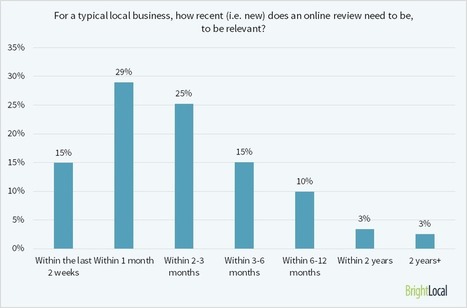
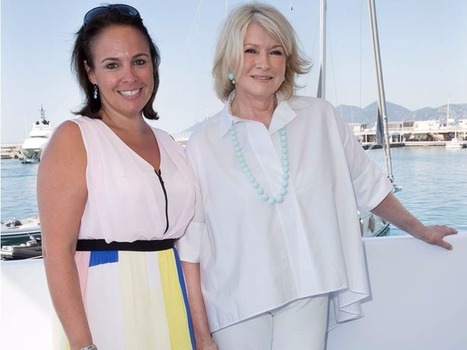







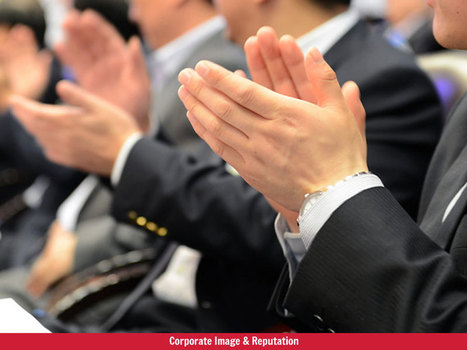
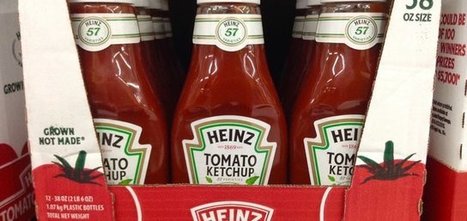
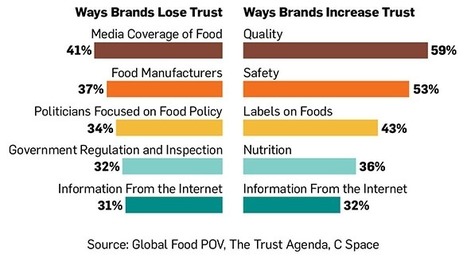




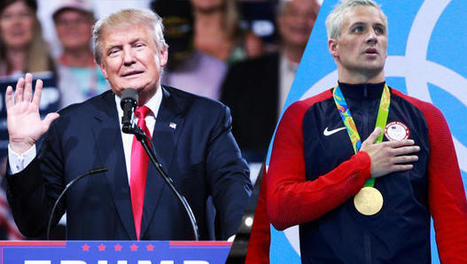

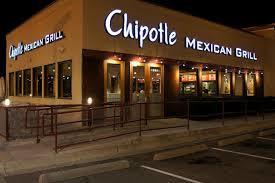
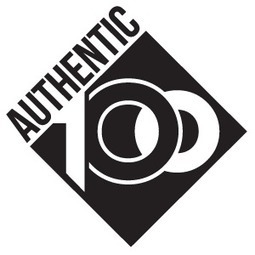
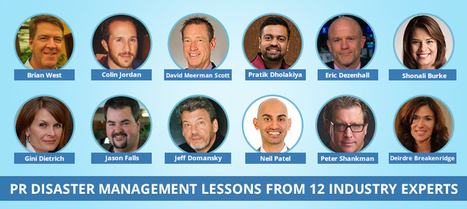
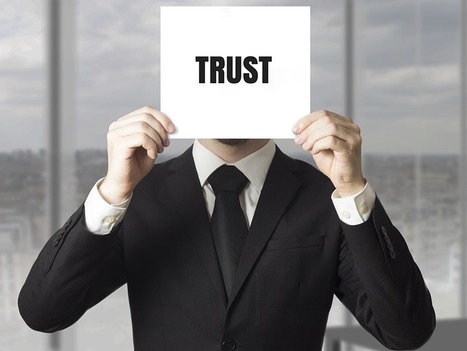
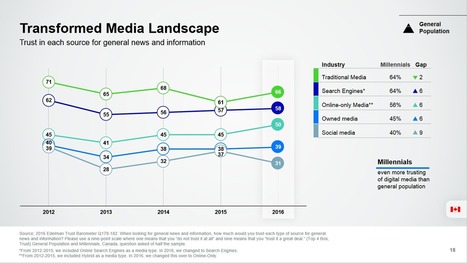







Several crisis communications experts share their advice on how to use a loyalty program to regroup and recover from a crisis. I wouldn't reach for my loyalty program first in a crisis but I'm open minded on using data to help. It seems insensitive to me to say "Sorry our food made you sick. Here's a free beef burrito!"